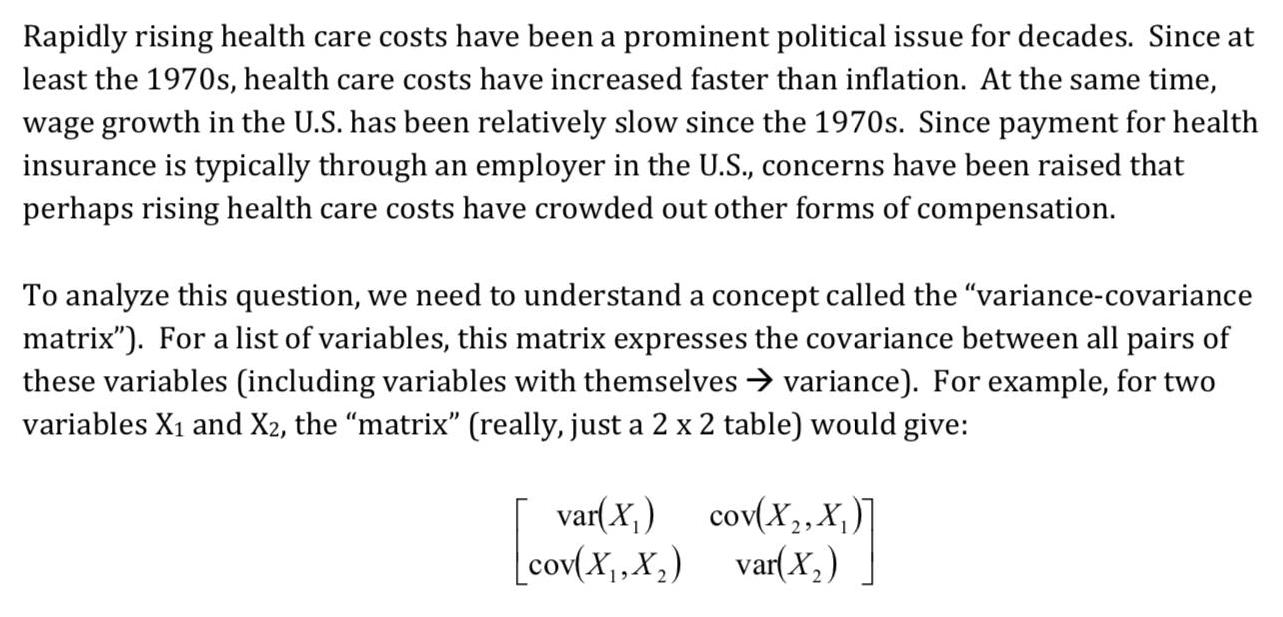Answered step by step
Verified Expert Solution
Question
1 Approved Answer
Rapidly rising health care costs have been a prominent political issue for decades. Since at least the 1970s, health care costs have increased faster

![Notice that the covariance in the upper right corner is redundant, since covariance is symmetric (cov[X1,X2] = cov[X2,X1]). S](https://dsd5zvtm8ll6.cloudfront.net/si.experts.images/questions/2022/03/6243e4ac7e16e_1648616618978.jpg)
Rapidly rising health care costs have been a prominent political issue for decades. Since at least the 1970s, health care costs have increased faster than inflation. At the same time, wage growth in the U.S. has been relatively slow since the 1970s. Since payment for health insurance is typically through an employer in the U.S., concerns have been raised that perhaps rising health care costs have crowded out other forms of compensation. To analyze this question, we need to understand a concept called the "variance-covariance matrix"). For a list of variables, this matrix expresses the covariance between all pairs of these variables (including variables with themselves variance). For example, for two variables X and X2, the "matrix" (really, just a 2 x 2 table) would give: var(X,) cov(X, X) cov(X, X) var(X) Notice that the covariance in the upper right corner is redundant, since covariance is symmetric (cov [X,X2] = cov[X2,X1]). So sometimes it is left out. To get preliminary evidence on whether rising health care costs may have reduced wage growth, you obtain yearly (time-series) data from the Economic Report of the President on growth in wages and health care costs. Their var-cov matrix is: %Awage %AhealthSpend %Awage %Ahealth Spend 2.69322 -1.31575 1.72842 a. Provide an OLS estimate of the slope of a regression of growth in wages on growth in health care spending. (Syntax is "regression of Y-variable on X- variable") b. Interpret the magnitude of this estimate (i.e., describe your result in terms of the units of the variables involved) c. Provide an OLS estimate of the slope of a regression of the "reverse" regression: growth in health care spending on growth in wages. d. Comment (briefly) on the following statement: "By estimating the reverse regression, we show that not only do rising health care costs cause wages to grow more slowly, but that rising wages cause health care costs to grow more slowly." e. What is the R of the regressions in (a) and (b)? In words, what do these magnitudes tell us?
Step by Step Solution
★★★★★
3.30 Rating (165 Votes )
There are 3 Steps involved in it
Step: 1
To estimate the slope of a regression of growth in wages on growth in health care spending you can u...
Get Instant Access to Expert-Tailored Solutions
See step-by-step solutions with expert insights and AI powered tools for academic success
Step: 2

Step: 3

Ace Your Homework with AI
Get the answers you need in no time with our AI-driven, step-by-step assistance
Get Started


